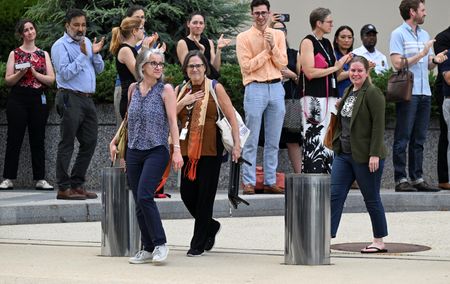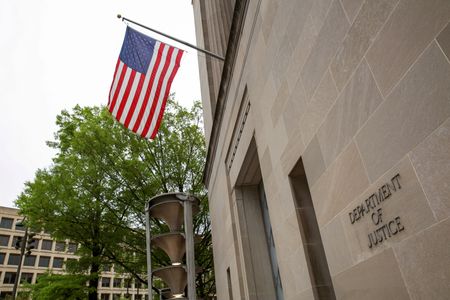By Sarah N. Lynch
WASHINGTON (Reuters) -A U.S. judge on Tuesday declined to jail two men accused of impersonating federal agents and supplying Secret Service personnel with gifts, dealing a blow to prosecutors who had argued that the defendants pose a danger and should be detained.
Arian Taherzadeh, 40, and Haider Ali, 35, were arrested last week and are accused of providing gifts worth thousands of dollars such as rent-free apartments and iPhones to Secret Service agents, including one who protected first lady Jill Biden.
The Secret Service is the agency responsible for protecting the president and other top U.S. officials.
“There’s been no showing that national security information has been compromised,” U.S.
Magistrate Judge Michael Harvey said.
Harvey ordered both men to remain in home confinement, subject to GPS monitoring, with their parents and that they surrender their passports and stay away from airports and embassies.
Harvey agreed to stay his order until Wednesday morning while the government mulls whether to appeal.
The judge said prosecutors did not prove the defendants tried to infiltrate the Secret Service with nefarious purposes, and noted they were so “spectacularly outed” that there is no risk anymore that they can continue to pose as agents.
Harvey said neither defendant is charged with a violent crime and neither one faces a stiff prison term if convicted – all elements that work against the prosecution’s claims they pose a danger to the community.
Harvey added there have been “significantly worse and more dangerous impersonation cases” before the court in the past.
At the same time, Harvey said he does believe prosecutors have enough evidence to secure convictions in the case.
The challenges prosecutors faced in convincing Harvey to detain the defendants appeared to stem, at least in part, from the rushed nature of the investigation.
Earlier on Tuesday, federal prosecutor Joshua Rothstein told the judge the FBI was forced to move before it was ready against the two after a Secret Service investigator for unclear reasons tipped them off that they were under scrutiny.
In a hearing, Rothstein said the tip-off occurred on April 4 after the Secret Service launched an internal inquiry and placed four agents on administrative leave for accepting gifts from Taherzadeh and Ali.
“An investigator, as part of that internal investigation, reached out to Mr.
Taherzadeh via email … saying that he needed to get information, and Mr. Taherzadeh responded,” Rothstein told the judge.
Rothstein did not explain why the Secret Service investigator informed Taherzadeh about the inquiry.
There was no indication the tip-off was intended to protect the defendants, but it prompted the Justice Department to rush the next day for the court’s approval for a warrant that preceded the arrests last Wednesday.
“Because this matter is pending adjudication by a federal court, it is not appropriate for the Secret Service to make any comments on prosecutorial statements,” a Secret Service spokesperson said in an email to Reuters.
(Reporting by Sarah N.
Lynch; Editing by Will Dunham and Lincoln Feast.)











